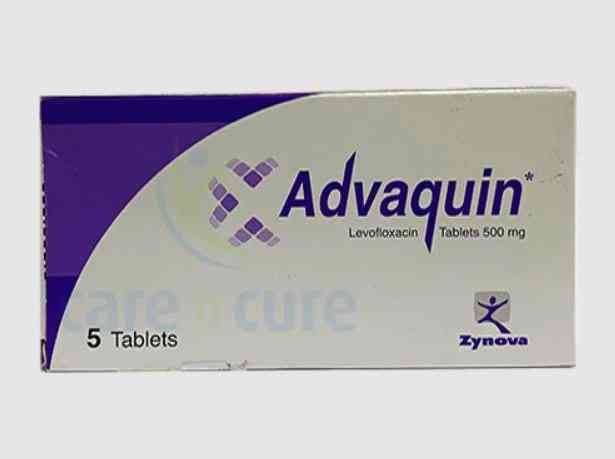ADVAQUIN 500mg features an exceptional active ingredient renowned for its potent effects, comprising Levofloxacin (as hemihydrate). This powerful formulation provides a superior solution for addressing diverse health concerns. With 500mg/Tablet concentration and an easily manageable Tablets/Film-coated, it remains a preferred option for countless individuals seeking effective treatment.
What is advaquin 500mg 5 tab?
Levofloxacin is an antibiotic that belongs to the group of fluoroquinolones. It is used to treat different types of infections caused by bacteria that are sensitive to this group of antibiotics.
Levofloxacin stops the growth of bacteria by inhibiting the enzyme DNA gyrase, which is important for the growth of bacteria and the synthesis of bacterial DNA.
This medicine is only used to treat bacterial infections that cannot be treated with other antibiotics, because levofloxacin belongs to a group of fluoroquinolones that can cause serious side effects.
What are the uses of Advaquin 500mg ?
Levofloxacin is used in the treatment of bacterial infections only, and the most important treatments that it is used in its treatment include:
Pneumonia.
Hospital acquired pneumonia.
Chronic prostatitis.
Complicated urinary tract infection.
Acute pyelonephritis.
skin infections
Acute bacterial sinusitis.
Uncomplicated urinary tract infections.
Acute exacerbations of chronic bronchitis.
pulmonary anthrax; Post-exposure treatment.
the plague; Prevention and treatment.
What are the contraindications of advaquin 500mg 5 tab?
It is forbidden to use the drug without consulting a specialist doctor in the following cases:
Hypersensitivity to levofloxacin or any of its components, or to other quinolone antibiotics.
Ulcerative colitis.
History of tendon disorders associated with fluoroquinolones.
Epilepsy, where there is a relationship between medication and seizures.
Bean anemia.
Children and individuals under 18 years of age, due to concerns about their joint disease or deformities.
impaired renal function; Dosage must be adjusted.
What are the drug interactions of Advaquin?
It is recommended to tell the doctor or pharmacist about all medications, herbs, vitamins, and nutritional supplements that the patient is taking before starting treatment.
It is advised not to use it in conjunction with the following medicines:
Medicines that reduce the absorption of levofloxacin, so it is recommended to take levofloxacin two hours before or two hours after taking these medicines, which are:
Antacids, such as aluminum hydroxide and magnesium hydroxide.
Iron.
Vitamin and mineral supplements that contain iron, zinc or magnesium.
Didanosine
sucralfate.
How to use Advacoin
The tablets should be taken 1 hour before eating or 2 hours after eating.
The analysis doctor should be informed that the patient is taking this medicine before any analysis is performed.
You must adhere to the doses specified by the doctor.
Treatment should be completed for the specified period, depending on the case, even if symptoms improve.
The use of the drug should be discontinued if any side effects appear.





0 Comments